Red River Scrapbook
Sherman's broken circle
By Edward Southerland
Sep 18, 2019
The founding organization started in the 1890s, at the apex of the fraternal order movement in the United States. In the robust democracy of the new world, men found benefits in banding together as Elks, Moose, Odd Fellows, and dozens like groups to promote their communities and maybe, just maybe, do a little business on the side. It was the era of the joiner, 30 years before George F. Babbitt rose to fame in the zenith of Sinclair Lewis.
Joseph Cullen Root founded the Modern Woodmen of the America in Lyons, Iowa in 1883 as a society to provide life insurance for its members. Motivated by a sermon extolling the image of “pioneer woodsmen clearing away the forest to provide for their families,” Root was determined to start an organization that “would clear away problems of financial security for its members.”
The organization soon developed schisms among several different factions, and so Root moved the society to Omaha, Nebraska in 1893 and reinvented his creation as the Modern Woodmen of the World. He soon dropped the “Modern” from the name and Woodmen of the World it stayed.
William McCully of Independence, Kansas got the first policy but Willie O. Warner of Niles, Michigan collected the first claim. The unfortunate Mr. Warner drowned on June 14, 1890. By the end of that year the society’s books showed receipts of more than $59,000 and payouts of more than $58,000. Balance on hand, $877.09. But things got better quickly. By 1900 the Woodmen had $219 million of life insurance in force. Today, the Woodmen, now styled Woodmen Life, boast more than 825,000 members and their families who hold one million insurance and annuity certificates.
In 1892 a women’s auxiliary, the Supreme Forest Woodmen Circle, was created to extend benefits to the wives of society members and other women, who, in those times, often found it difficult to buy life insurance policies. The local units were called “Groves” and came under the overall supervision of the “Supreme Forest.” One of the early members of the Circle was a Texas school teacher named Dora Alexander and it is about her and her vision for the group that this story really must concentrate.
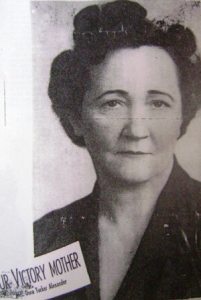 |
| Dora Tucker Alexander |
Dora Alexander grew up in Garland, the daughter of a school teacher, a calling she followed early in her life. In 1919 she married John R. Talley of Garland. Early on Mrs. Talley became involved with the local Woodmen’s Circle Grove. She was elected as a delegate from Texas to the national convention in 1911 where she was chosen Supreme Clerk (national secretary) and moved to the Circle headquarters in Omaha to take up her duties. While in this post, she begin to make plans for a Woodmen Circle home for retired, indigent members and the orphans of members.
Working with Circle president Mary E. LaRocca, Mrs. Tally saw her dreams and plans moved forward and in 1930, on the windy hill west of Sherman her dream begin to take shape. John Talley became president of the Woodmen Circle Insurance Company in 1934, and the original building, later named for him, enclosed 41,000 square feet, but by 1940 it was filled with retirees and children.
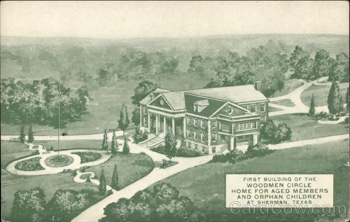 |
| An artist's rendering of the original building. |
That year a second building, subscribed to by Woodmen groves in Pennsylvania was built. In their honor it was christened “Pennsylvania House.” Eventually an infirmary was added along with numerous outbuildings.
The home kept a large garden, milk cows, chickens, hogs, and caught fish from a large lake on the property. Lillian Pelley of Sherman was raised at the home. The Sherman Museum has pictures of her wedding in the main room in 1946. “I had a 100 grandmothers,” recalled Pelley in an interview with Dale Milford in 1992.
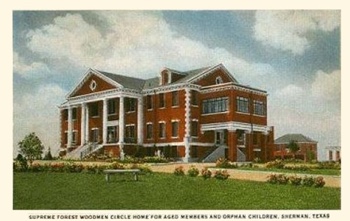 |
| A colored post card of the main building |
The boys and girls who grew up in the home recall that no one in Sherman treated the orphans as second class citizens. “Our school mates loved to come out the big house—then located a ways out of town. They enjoyed eating at the big table, swimming in the lake and being spoiled by all the grandpas and grandmas.”
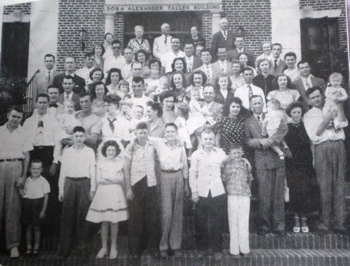 |
| Judging from the clothing styles, this group picture of some of the Home's residents would be in late 1940s or early 1950s. |
In 1988, many of the former residents of the home came back to Sherman for a reunion. Sherman Democrat writer Rick Smith chronicled some of their memories. “I’ll never forget the day I came here as a child. I was scared to death,” recalled Edna Glendenning. “I was an only child without parents. My grandparents raised me, and when they died I was told this was where I would go. I was terrified at first. But this was a real home, not an institution. We did all the things that other children do when growing up. And the people here became our family. This was always home.”
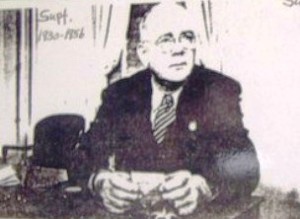 |
| James Arthur Alexander |
Dora Alexander Talley was not the only member of her family to play an important part in the Woodmen Circle home. Her brother, James Alexander, married another Dora, Tucker this time, in 1917 and in 1939 he became superintendent of the home. When her husband retired in 1959, his wife took the post, holding the job until 1962. Both Alexanders were an active part of Sherman life and the community during their long residence here.
At some point, some unknown author composed a short poem about the Woodmen Circle Home that sums up the story with a certain grace.
Tis our home for which we’ve labored
Abundantly, our task is favored.
Here’s the sum of our story,
Here’s our fortune and our glory.
These great walls and friendly doors
Mark the goals we’ve struggled for.
Who can tell its splendid worth,
As high it towers above the earth?
All the world will plainly see
The dream made real by you and me.
A house is built of bricks and stone,
Of tiles and posts and piers.
But a home is built of loving deeds
That stand a thousand years.
Unfortunately the era of the Woodmen Circle Home was far less that a millennium. The home closed its doors in 1970, the victim of changing times and increasing government regulation of such activities. It stands today on the hill west of Sherman, slowly crumbling and decaying with only the echoes of the shouts of the children and the stories of 100 grandpas and grandmas to keep it company.
 |
| The Woodmen Circle Home today--gone but not forgotten. |
This article was prepared with material from the Sherman Museum and stories previously published in the Sherman Democrat.





